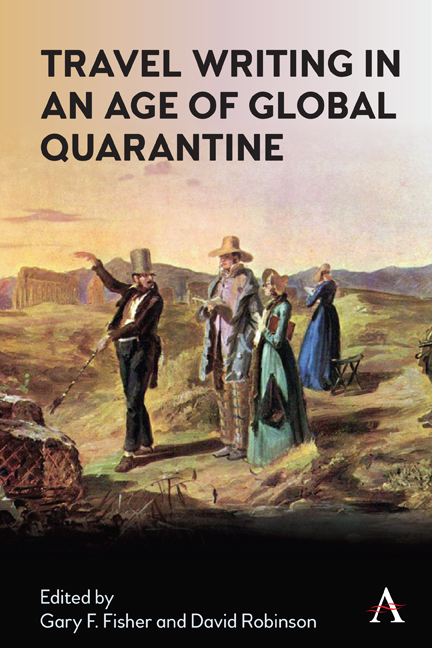Book contents
- Frontmatter
- Contents
- Foreword
- Acknowledgements
- Introduction
- Chapter One ‘Off-Stage, A War’: Wuhan, 1938
- Chapter Two Frederic Lees in Varese Ligure, 1911
- Chapter Three ‘A Rude People Subjected to No Restraint’: In Tanimbar with Anna Keith Forbes, Henry Forbes and So’u Melatunan
- Chapter Four Sent to Coventry: A Journey Home?
- Chapter Five Bedouin Is a Place: Freya Stark’s Travel with Nomads
- Chapter Six With Wilkie in the West: Reading Wilkie Collins’s Rambles beyond Railways from a Cornish Perspective
- Chapter Seven Picturing Rome: Walking the Eternal City with the Last Victorian
- Chapter Eight Su e zo per i ponti; or, How History Does Not Help
- Chapter Nine A Town Called Entropy: Boom and Bust in Arnold Bennett’s Potteries
- Chapter Ten Travelling towards Transculturalism? Statues, Remembrance and Mourning in Bloemfontein, South Africa
- Chapter Eleven Recollections of the King’s House
- Chapter Twelve Occupying Her Time: Ginette Eboué, France, 1940–42
- Epilogue
- List of Contributors
- Works Cited
Introduction
Published online by Cambridge University Press: 18 November 2021
- Frontmatter
- Contents
- Foreword
- Acknowledgements
- Introduction
- Chapter One ‘Off-Stage, A War’: Wuhan, 1938
- Chapter Two Frederic Lees in Varese Ligure, 1911
- Chapter Three ‘A Rude People Subjected to No Restraint’: In Tanimbar with Anna Keith Forbes, Henry Forbes and So’u Melatunan
- Chapter Four Sent to Coventry: A Journey Home?
- Chapter Five Bedouin Is a Place: Freya Stark’s Travel with Nomads
- Chapter Six With Wilkie in the West: Reading Wilkie Collins’s Rambles beyond Railways from a Cornish Perspective
- Chapter Seven Picturing Rome: Walking the Eternal City with the Last Victorian
- Chapter Eight Su e zo per i ponti; or, How History Does Not Help
- Chapter Nine A Town Called Entropy: Boom and Bust in Arnold Bennett’s Potteries
- Chapter Ten Travelling towards Transculturalism? Statues, Remembrance and Mourning in Bloemfontein, South Africa
- Chapter Eleven Recollections of the King’s House
- Chapter Twelve Occupying Her Time: Ginette Eboué, France, 1940–42
- Epilogue
- List of Contributors
- Works Cited
Summary
Second travellers do not simply imitate the experiences made by previous authors […] because they return to previous texts and to paths already travelled, the journeying subject may discover not only the first traveller, but perhaps also him or herself.
As we write, the 2020 Covid-19 outbreak continues to pose an unprecedented challenge to the travel writing community, but in our isolation from places, spaces and landscapes, we can still turn to historical travel accounts to remind us of the locations we have previously visited. Although, currently, ‘a way of life driven by unceasing mobility is shuddering to a stop’ and ‘our lives are going to be more physically constrained’, as John Gray notes, ‘an advantage of quarantine is that it can be used to think afresh’. Travel Writing in an Age of Global Quarantine is a collection of chapters by authors from a variety of backgrounds. We have gathered an ensemble cast of distinguished and widely published travel writers, novelists and academics. Each contributor travels vicariously, writing about a place they have visited, with reference to an historical account of the same place.
Travel Writing in an Age of Global Quarantine is something of a double entendre. We have asked contributors to ‘travel’ while subjected to epidemiologically mandated isolation. Yet, these travels are anything but isolated, as they are conducted in the company of an historical companion. Whether it be living with Freya Stark and the Bedouin in the Sinai Peninsula, riding with Dorothy Wordsworth in her nineteenth-century ‘travelling car’ through the Scottish Highlands or hiking Liguria with Frederic Lees in 1913, our personal memory and understanding of space and place is influenced by our historical predecessors. Our current enforced stasis offers us a unique opportunity to explore this process. Hopefully, the recent vaccines will free us once again, and for the future reader, this book will serve to explain what it felt like not to be able to move, to travel. This is how we explored and imagined the places we had been before.
Prior to early 2020, Wuhan was not a place that loomed large in the European imaginary. It is now, perhaps, the most famous place in the world. Strangely, this is the third time that Wuhan has risen from obscurity to worldwide prominence, as Jonathan Chatwin discusses in the opening chapter of this volume.
- Type
- Chapter
- Information
- Travel Writing in an Age of Global Quarantine , pp. 1 - 10Publisher: Anthem PressPrint publication year: 2021



